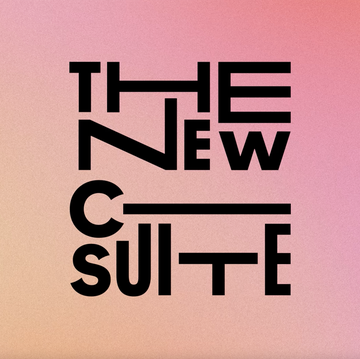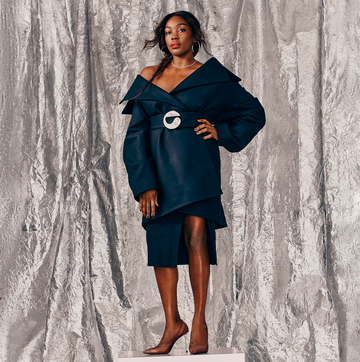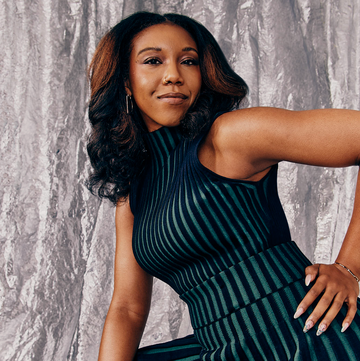Lilit Marcus had had enough.
After months of her boss screaming at her, calling her stupid, and singling out her and other women in the office with misogynistic comments and requests — “He would just walk up to a young woman and demand that she make him coffee,” Marcus recalls — she did what she thought she was supposed to do. She went to human resources.
Marcus tearfully read a detailed list of her boss’s offenses to the company’s HR rep, explained that he was creating a hostile environment, and suggested she be reassigned to work for another partner. But to her shock, HR didn’t offer her a solution. Instead, according to Marcus, “she basically said, ‘Look, he's old. He's set in his ways. It's really hard for people like him to change. But you're young. You can change. The best thing that you can do is learn to deal and to anticipate what he's going to need from you.”
That meeting was a wake-up call for Marcus, now a 32-year-old editor in New York. Her boss was considered indispensable, but she was not. In fact, she believes the HR rep may have been just as intimidated by her boss as she and the other women in the office were. A few months later, Marcus resigned, and went on to write a book, Save the Assistants: A Guide to Surviving and Thriving in the Workplace.
“Everyone told me that HR's job was to look out for me,” Marcus says. “I felt like I had held up my end of the bargain, but HR hadn't held up theirs.”
Marcus’s case may sound all-too-familiar in light of the litany of rape, sexual harassment, and other misconduct allegations against Harvey Weinstein. According to The New Yorker, employees at the Weinstein Company said its HR department was utterly ineffective and complicit in Weinstein’s behavior, failing to investigate employees’ complaints and, warning one accuser, temporary assistant Emily Nestor, “that Weinstein would be informed of anything she told them.”
HR was “a place where you went to when you didn’t want anything to get done… because everything funneled back to Harvey,” one female executive told the magazine. The tone of HR’s response to complaints about Weinstein’s misconduct, she told the New Yorker, was typically: “This is his company. If you don’t like it, you can leave.”
It makes sense to feel like human resources has your back — they might be the ones who greet you on orientation day or walk you through how maternity leave works. In many company handbooks, employees are told to report everything from clashes with managers to unlawful behavior like sexual harassment or discrimination to HR, which can make them feel like kindly in-house therapists. But, in reality, HR is not necessarily your friend.
“A good HR person looks like she's on your side, but if your side isn't in the best interest of the business, she'll side with the business,” says Suzanne Lucas, who spent a decade as a corporate human resources rep at companies including Wyeth Pharmaceutical and Wegmans Food Markets and now authors the blog, Evil HR Lady, which demystifies HR.
While it is human resources’ responsibility to make sure people are treated fairly at work, when conflicts arise, human resources may downplay or ignore an employee’s complaint in an attempt to protect powerful executives, or shield the company from negative media attention or a lawsuit.
According to Philadelphia employment attorney Gregg Zeff, who has represented women in class-action sexual harassment lawsuits against their employers, HR’s response to a complaint can depend on how much the company values the people involved. “If you're a senior VP and some young clerk makes a nasty comment about your body, that clerk's going to lose their job. If a senior VP makes unwanted sexual advances or sexual comments, HR’s going to protect the vice-president,” he says. “It’s about power.”
Contrary to popular belief, HR reps are not required to keep staffers’ secrets. There is no guarantee that they won’t share a woman’s sexual harassment complaint with the very person harassing her at work, putting her at risk of more or worse harassment and retaliation — firing, demoting, or otherwise punishing someone for complaining about harassment or discrimination. Retaliation is against the law as a violation of the Civil Rights Act, but it is one of the most-alleged forms of workplace discrimination, according to the Equal Employment Opportunity Commission (EEOC), the federal agency that oversees workplace discrimination.
The irony is that HR — which is supposed to be the first line of defense for employees — can be the same department that shuts them down.
Such was the case for (now-former) Uber engineer Susan Fowler, who wrote in a viral open letter earlier this year that Uber HR reps ignored sexual harassment complaints from her and multiple other women, failing to crack down on Uber’s now-well-documented sexist company culture.
When Fowler reported her manager for chatting her via company messenger that he was in an open relationship and looking for women to have sex with, “I was told by both HR and upper management that even though this was clearly sexual harassment and he was propositioning me, it was this man's first offense, and that they wouldn't feel comfortable giving him anything other than a warning and a stern talking-to,” Fowler wrote. She says upper management also told her that her manager was a “high performer” and “they wouldn't feel comfortable punishing him for what was probably just an innocent mistake.”
But Fowler says that when she found out that other women were also accusing the manager of sexual harassment, she confronted HR again, and was again and told the manager was a one-time offender. Later, Fowler says an HR rep told her that she was the “common theme in all of the reports” she’d filed to HR and asked her “if I had ever considered that I might be the problem.”
“We all gave up on Uber HR and our managers after that,” Fowler wrote.
A string of recent court cases reveals HR can play a key role in dismissing, blaming, and attempting to silence women alleging sexual harassment and other discrimination at work. In some instances, human resources can become a “tool for further discrimination,” says Deborah Marcuse, an employment attorney at Feinstein Doyle Payne & Kravec in Pittsburgh.
Jennifer Jones, 37, a former pharmaceutical salesperson at Forest Laboratories in Fort Worth, Tex., alleges that HR tried to blame her after she complained that a manager sexually harassed her over the course of two years. In a class-action gender discrimination lawsuit, filed in 2014, Jones claims the harassment began at one after-work drinks gathering in 2008, when the manager allegedly mouthed to a table of employees that he’d “f*ck the shit out of her,” and later propositioned her. It continued, Jones told me, with the manager creating a hostile environment. “He's the guy that looks women up and down, and treats them like they're a piece of meat,” Jones says.
After Jones rejected the manager in 2008, she says he “aggressively” urged her not to report him to human resources because he didn’t want other colleagues — or his wife — to find out about his behavior. Uncomfortable yet not wanting to complain to HR as a new employee, Jones agreed.
But two years later, in 2010, she snapped: the male manager had been assigned to Jones’s sales team, giving him increased oversight over her work, and according to Jones, he began to threaten her job security. Jones alleges in a court filing that the manager told another colleague that Jones was “not a valuable member of the team"; Jones also told me that after the man became her manager, she began receiving negative performance reviews (her first ever at the company) from a woman who had managed Jones since Jones started at the company. Fearing for her job, Jones sent a written report of her manager’s alleged harassment to HR. But she says it took almost two months before an HR director met with her, during which time she continued to work under her alleged harasser.
“It was a really, really bad time in my life, where I didn't feel comfortable at work,” Jones told me. Normally a leader, “I got extreme anxiety during meetings. I just would ball up.”
When Jones did meet with an HR rep, she alleges that the majority of the meeting was spent talking not about her sexual harassment complaint but about her job performance. Despite being ranked 16 out of 100 sales reps in her region, Jones says she was put on probation, and she resigned shortly thereafter. (Allergan, the company that acquired Forest Laboratories in 2014, did not respond to requests for comment.)
“I always thought HR was safe, always there to support the employees... They seem like they're your friend,” Jones says. But after, she says, her complaints to HR were twisted and turned on her, “I felt nobody was there to protect me. I had to, basically, protect myself.”
Jakita Miller, 37, detailed years of alleged HR failures in a recently dismissed race discrimination lawsuit against Zurich insurance company in New York. Miller, who is African-American, claimed that during her decade-long tenure at the company, she applied an estimated total of 25 times for promotions and new positions, only to be repeatedly passed over for less-qualified Caucasian applicants and rebuffed by HR when she asked why she wasn’t getting the jobs. (A June 2015 investigation by the EEOC found that Zurich’s New York office discriminated against African-American applicants and employees in its hiring practices.)
Race discrimination was “Zurich’s standard operating procedure,” Miller alleged in court documents, “one to which the company’s own Human Resources department displays a deliberate indifference.”
According to Miller, Zurich’s HR department facilitated racial discrimination by its recruiters and hiring managers by brushing off her repeated requests for feedback. In 2012, after Miller emailed HR asking why she wasn’t being promoted or hired for the dozens of jobs she was applying to, she says a Zurich HR representative suggested she “work on differentiating yourself through development opportunities,” including an external underwriting certification course. It was a suggestion Miller says several African-American candidates told her they’d also received, despite the fact that multiple Caucasian candidates were being promoted and hired at Zurich without completing the certification class — and with less professional underwriting experience than Miller. In another meeting with HR in 2012, Miller says the same HR rep told her she would need “rebranding” to climb the ladder at Zurich.
“I didn't feel that HR really took the complaint seriously when I presented it to them,” Miller told me. “I don't feel like they addressed the issue at all.” The more dismissive conversations she had with HR, the more Miller says she came to believe Zurich was discriminating against her based on her race. “HR was the final straw,” she says. “It was the icing on the cake.”
Miller says she is not aware whether Zurich investigated her complaints of racial discrimination, but Zurich denied the allegations and recently reached a settlement with Miller, and the case was dismissed. "We have consistently taken steps to improve and expand our diversity and inclusion efforts, including becoming a founding partner of the Business Insurance Diversity & Inclusion Institute, and in conjunction with the Institute, issuing a public written commitment to diversity and inclusion in September 2016,” Zurich head of human resources Brian Little told me in a statement.
Miller left Zurich in 2016 for another insurance company, which based on her credentials, promptly hired her in a new sector of the business. “They saw value in me,” she says, a boost to her professional self-esteem after years of blows at Zurich. “I'm still digging myself out of that hole. I felt defeated as a person. It had knocked me down so much, just with questioning myself and trying to understand why, in this day and age, are these things still happening? Why is HR not being helpful?”
So, what can employees reasonably expect from HR? “A good HR person is precisely the person you want to turn to if you have a boss who doesn't give clear guidelines, or a co-worker who doesn't do her job,” Lucas says. “A bad HR person will just tell your boss directly and make you look bad, but a good HR rep should provide coaching and guidance.”
Good human resources reps take reports of harassment or discrimination seriously and ensure that they’re investigated by impartial parties. According to HR experts, if an investigation finds wrongdoing, the people responsible should be punished, whether by firing, demotion, probation, or a reprimand in their file.
It’s key to educate yourself about company policies and the laws regarding your rights, including discrimination, harassment, and maternity or disability leaves. The more aware you are of the rules, the easier it will be to recognize if HR is breaking them.
According to Marcuse, it’s easy to doubt yourself, especially if HR attempts to dismiss or twist your report. “When that person turns against you, you feel like you've gone insane,” she says. “You feel like it must be your fault. Like you must have done something wrong, but you haven't. The only way change happens is when people do speak up.”
Read more:
What To Do If You're Harassed At Work — And HR Isn't Helping
Here's How Sexual Harassment Settlements Really Work













